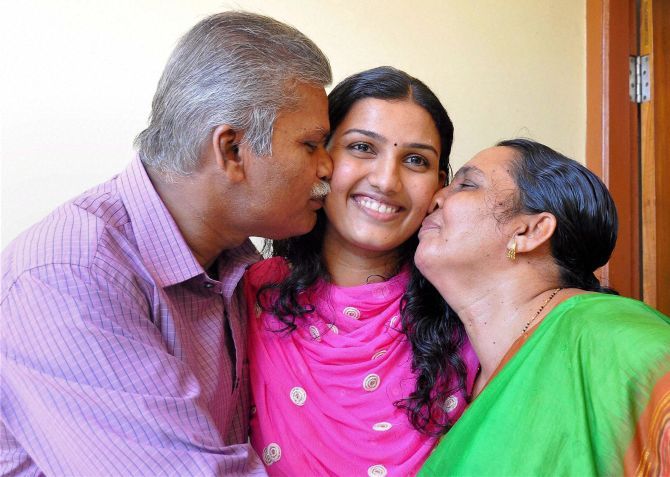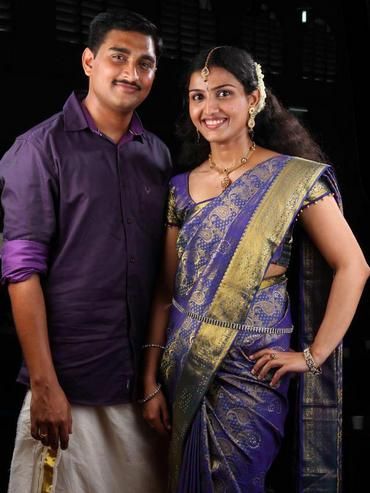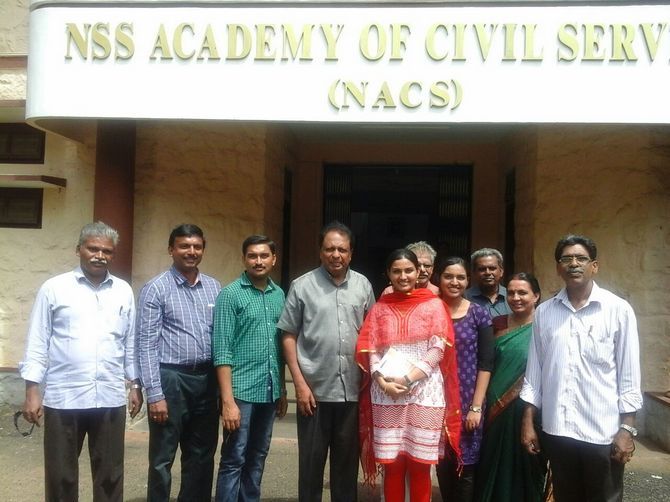'The popular belief is that unless they come from English speaking, sophisticated and affluent families, prepare at a young age, get educated in a first rate college, go to a coaching class in one of the metro cities, take the examination several times, the aspirants cannot make it to the civil services list, particularly its very top.'
Ambassador T P Sreenivasan -- who serves in an honorary capacity at the NSS Academy where Renu coached for the IAS -- on how she surprised even herself by topping the UPSC exam.

By securing the second rank in the UPSC civil services examination this year, a 27-year-old married medical graduate, born in a Kerala village to a bus conductor father and educated, but unemployed mother, Renu Raj has exploded many civil services myths.
The popular belief is that unless they come from English speaking, sophisticated and affluent families, prepare at a young age, get educated in a first rate college, go to a coaching class in one of the metro cities, take the examination several times, the aspirants cannot make it to the civil services list, particularly its very top.
Renu Raj is not the first to explode some of these myths. Several other women have registered major successes. Two years ago, Haritha Kumar, from a similar background, an engineer, made it to the first rank.
Many years earlier, Nirupama Rao had secured the first rank. Last year, Divya Iyer, a doctor, did well and joined the coveted Kerala cadre. A rank holder throughout her academic life, a high achiever in many areas and a published author and editor, she was expected to be at the very top.
Renu is undoubtedly a product of the changing civil services scene across the country. The examination was always tough, as it followed the pattern of selection of the Indian civil service officers in the colonial era.
The change came first when the profile of the recruits changed from the urban to the rural. The rural rich landowners in several states lost their old wealth and power on account of land reforms and distribution of wealth. They discovered that the only way for them to recover their lost prestige was to get their children into the civil services, particularly IAS and IPS.
Hordes of young people migrated to Delhi to find short cuts to success in the civil services examination. A virtual IAS industry grew from the elite institutes like Rao's Study Circle in Connaught Place to sweat shops on Mukherjee Street, where youngsters were spoon fed with readymade answers to old question papers and digested notes on every optional subject.
Aspirants from Bihar and UP began to qualify in large numbers.

Kerala had made a modest contribution to the civil services throughout, but it caught on to the new trend only in the beginning of the 21st century.
The first State Civil Services Academy came into being in 2004 and several other coaching centres came up all over the state.
A major facility offered by the government was the 'adoption scheme', which provides airfare and accommodation in the comfortable Kerala House in Delhi at the time of the UPSC interview.
The number of entrants from Kerala, which had reduced to a trickle in the 1980s and 1990s, picked up. The trend has continued and Kerala began to produce about 8 per cent of the recruits in the last ten years. This year, there are nearly 40 recruits, many of them with high ranks.
Image: Renu Raj with her husband Dr L S Bhagat. Courtesy Renu Raj/Facebook.
The increase in the age limit and the number of permissible chances changed the scene completely. The upper age limit rose from 23 to 32 and the chances increased from 2 to 6. This enabled doctors, engineers, IIT and IIM graduates and others to take the place of arts and humanities graduates to a great extent.
Instead of a few, who took the risk of not taking up professional studies, the brighter students went to professional courses, secured jobs, worked for a few years, raised families in some cases and then took the civil services examination.
Though the standard expected of the candidates is at the master's level, graduates began to prepare full time in the academies instead of joining postgraduate courses. Introduction of Hindi and regional languages and literature also contributed to the change of the profile of the candidates further.
The lure of Mukherjee Road took some to Delhi and other metro cities. The theory of 'catch them young' was given the go by.
For Renu, who obtained the 4th rank in the Class 10 and 13th rank in plus two exams, it opened up immense possibilities because of the changed circumstances and nature of the examination.
She breezed into a government medical college, passed the MBBS examination in flying colours, married a doctor and began to practice medicine.
Her parents, who had seen her win prizes for elocution and do well in extra curricular activities, developed ambitions to get her into the IAS, shifted to a rented house in Thiruvananthapuram to support her, with the full encouragement of her husband, L S Bhagat, who pursued his own medical studies elsewhere and the backing of her sister, Ramya Raj, also a medical student.
Her mother, V S Latha, a Malayalam literature graduate, trained her for the optional paper. Renu rose to the occasion, prepared on her own, even while working and later joined the State Academy, went to the Pala Academy for her Malayalam literature optional paper and the NSS Academy for the international relations module and model interviews.
She said that the International Relations Module was enough for her to score well in the relevant part of the General Studies paper.
Most aspirants go to several institutions for selected courses, for which they are famous. For instance, Pala has specialised in Malayalam and the NSS Academy in international relations. Everyone signs up with the State Academy to avail of the adoption scheme.
Renu went through the three stages, becoming one of the 13,000 out of 450,000 at the preliminary level, one of 5,000 at the mains level and second out of the 5,000.
She could not believe that she had spectacular success even after she saw her name on the UPSC web site.
An evangelist of the civil services, particularly, the IFS, I have been teaching at the various academies for more than ten years. In the last two years, I have been directing, in an honorary capacity, the NSS Academy.
The UPSC springs surprises every year. Some aspirants, with great promise, do not make it, while others do better than expected. The dynamics of the examination have their own vagaries. But one thing is certain: No one makes it without talent and hard work, even if some of the best do fail.
I noticed Renu at an International Relations Module, a special offering of the NSS Academy. Though she was not showy, she impressed me because of her pleasant demeanour, eagerness to learn and command of the language. In the tests we conducted, she always stood first. I was not surprised when she was chosen for the third stage of the examination and after a couple of model interviews, I was convinced that she would do extremely well.
I chose her, together with another aspirant, Parvathi, for a model interview on television, which went extremely well. Sadly, Parvathi, an economist, did not make it and Renu went on to get the second rank.

The civil services examination is truly transformational for those who make it. They are like pupae, which turn into butterflies overnight.
Others begin to see a halo around them and themselves blossom into mature, responsible and sophisticated individuals, as they climb the bureaucratic hierarchy. The nightmare of the preparations for the examination turns into a dream come true.
Renu may not have fully realised the transformation as yet, but all her interviews and speeches are joyous, generous about sharing credit with family, teachers and friends and expressing her concern for the poorest, lowliest and lost.
She attributes her success to commitment and hard work, not to any exceptional ability. She says she had expected to do well, but never dreamt of the second rank, particularly because, as a first timer, she did not have a sense of her capabilities in comparison to the others.
She will realise the full extent of her accomplishment and blessing only when she reaches the Lal Bahadur Shastri National Academy of Administration in Mussourie and meets the many well-healed and talented youngsters, with greater opportunities, whom she overcame.
Kerala is agog with jubilation over the repeated successes of its men and women, who have been joining the civil services in recent years. Among the men who have done extremely well in recent years are V Sriram, Johny Tom Varghese, Alby John and Abhiram Shankar.
One consequence of these successes will be an exponential growth in aspirants and training centres. The nation needs the best civil servants and Kerala is ready to make its contribution with officers like Renu, bright, committed and full of idealism.
REDIFF RECOMMENDS











 © 2025
© 2025